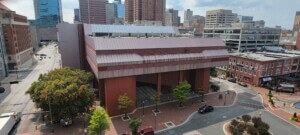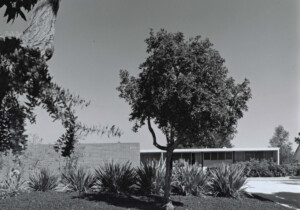Amid the latest in a series of temporary reprieves, Bertrand Goldberg’s former Prentice Women’s Hospital was again denied landmark status by the Commission on Chicago Landmarks.
Despite once again turning out a crowd of supporters who contributed hours of impassioned testimony, many preservationists were unsurprised by an outcome that they chalked up to political determinism.
“I have this suspicion that [owner] Northwestern [University] has put before us a false choice,” said Commissioner James Houlihan, who nonetheless voted along with all of his fellow commissioners to deny the 1975 building landmark status.
The commission Thursday reprised, in a way, a vote taken in November, in which they recognized the litany of evidence qualifying Prentice as an architectural landmark, voted to grant the building landmark status, and subsequently revoked their own decision in a second, almost unanimous vote. (The sole holdout during that vote, Christopher Reed, resigned at the end of 2012.)
Their reason for doing so, said commission Chairman Rafael Leon, was a provision in municipal code that called on them to allow testimony from the city’s Department of Housing and Economic Development. The jobs and tax dollars promised by new construction, they concluded, outweighed the building’s architectural significance—logic that preservationists took issue with on several levels.
In December the National Trust for Historic Preservation and the Landmarks Preservation Council claimed in court that the commission “acted arbitrarily and exceeded its authority,” when it denied the building landmark status by considering economic matters so prominently. Judge Neil Cohen dismissed that suit in January, but not without raising concerns over the commission’s transparency.
“The commission maintains that it did not violate the landmarks ordinance or any other law,” Leon said when it came time to discuss Prentice. To show their methods were “beyond reproach,” he said, they would again hear public testimony.
Jeff Case, a principal at Holabird & Root, was among the design professionals who opposed preservation, saying Prentice had “outlived its useful life.”
“The building has moved on, and so should we,” he said. “333 East Superior will not be missed.”
Carol Post of Thornton & Tomasetti concurred, citing structural problems in the building’s clover-shaped concrete shell.
Still many more echoed the sentiments of an open letter signed in July by more than 65 architects, calling on the commission to reject the recommendation of the Department of Housing and Economic Development that previously swayed them to withhold landmark protection.
“A Walmart will always generate more revenue than a water tower,” said Preservation Chicago’s Jonathan Fine. Christina Morris, a senior field officer in the National Trust for Historic Preservation’s Chicago office, similarly rebuked the commissioners for appearing to sidestep their civic duty.
“You have an obligation,” she said, “to protect Chicago’s cultural heritage.”
Since the commission’s November decision, preservationists have also attempted to meet Northwestern’s arguments on their own terms. Architects submitted four proposals for reuse that also included new buildings to satisfy Northwestern’s stated development needs. They claimed saving the Goldberg structure would result in an additional $103 million in one-time expenditures, $155 million annually in operating costs, $1.1 million in yearly tax revenue, and create 980 new jobs.
Northwestern dismissed those proposals Thursday in a statement that called their economic assumptions “deeply flawed.” The four alternatives were “not viable,” said Northwestern’s Eugene Sunshine, because of structural challenges presented by Prentice and because some of them relied on developing nearby vacant land not owned by Northwestern University, but by Northwestern Memorial HealthCare.
Commissioner Houlihan asked Sunshine if it was disingenuous to suggest the sister organizations could not get together and work out a solution to that problem. Sunshine said it was not. Dean Harrison, president of Northwestern Memorial HealthCare, later testified that NMH had “long-standing plans” to build something else on the site, but did not provide a timeline for that development.
Though Thursday’s decision could mark the end for preservationists in a long and heated fight, another court hearing is set for February 15.










